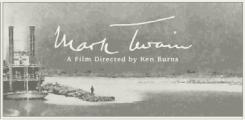Adult Services will be holding a Dinner & a Movie! event on Friday, February 14th at 6:30 p.m. in Mtg. Rm. B The movie will be one of this year's Oscar nominees: Judy starring Renee Zellweger will be shown and pizza will be served! Registration is required for this event and it begins on Monday, February 10th at 9:30 a.m.
Our Take on Ken Burns' "Mark Twain", Part 1

JBF began its second foray into documentary film by taking a look at not only biographical film-making but specifically the film-making of Ken Burns. Arguably the best documentary film-maker on Americana, Burns is most widely known for his long documentaries following the Civil War, Baseball, The West, and Jazz, but he has also made iconic films about significant persons and places in American history. Among them are the two we are looking at together: Mark Twain and The Statue of Liberty - one of his first films. We watched Part 1 of Mark Twain this month, and will be seeing Part 2 along with The Statue of Liberty next month.
Members appreciated the way Burns interweaves journal entries, period pictures and music into the narrative of the film -- and his use of first class performers to read or reenact passages and scenes from Twain's life. One area we liked about Burns use of actors and historical specialists was that he had them making their own personal observations about Twain along with using their expertise to support his narrative. We talked about this point in particular when mentioning that Hal Holbrook was, at the time, well-known for his one man show on Twain. It was interesting to see his enthusiasm for Twain, and the degree he went to in getting to know the author's background.
We noted that it was a bit of a surprise to hear about Twain losing his temper and throwing his shirts out the window when a button was missing, but we felt it reminded us that he was a person as well as an icon - and that even humorists can be out of humor! Some members had not realized the extent of Twain's travels. We also remarked on his decision to head West during the American Civil War, and how that was likely the only alternative a young man with ties to both South and North could have made without taking sides. We also thought it was interesting that we was first so well known as a lecturer: first with stories of his mining adventures in the West, and later as a traveler abroad. These travels, led to his novel "The Innocents Abroad". Part 1 ends with the background and publishing of Twain's masterpiece, "Huckleberry Finn" and explored why it has this status. Members mentioned that they hadn't realized what an impact the book had had when it was published, or that its influence was so strong on other noted American writers whonow wrote how Americans spoke, rather than in "the King's English". We were struck by the way Burns related one of the key points in Huck Finn: how he believes he's doing wrong, and will probably go to hell for not letting Miss Watson know where her slave Jim is. This led to deeper discussion about how do you get a whole culture or country to change its point of view on controversial issues. We felt that given Huck's background, age, and time period, it was actually a moment of triumph: recognition by Huck that he sees Jim as a human being through the relationship he'd built with Jim on the river that he can no longer deny. We talked about how for this point alone, we can see why it is considered Twain's most important book.
Part One ends at this point in Twain's story -- and we can hardly wait to get back to it! We are also curious to see how Burns handles things where the subject is an iconic American structure instead of a person, in The Statue of Liberty.
















Add new comment